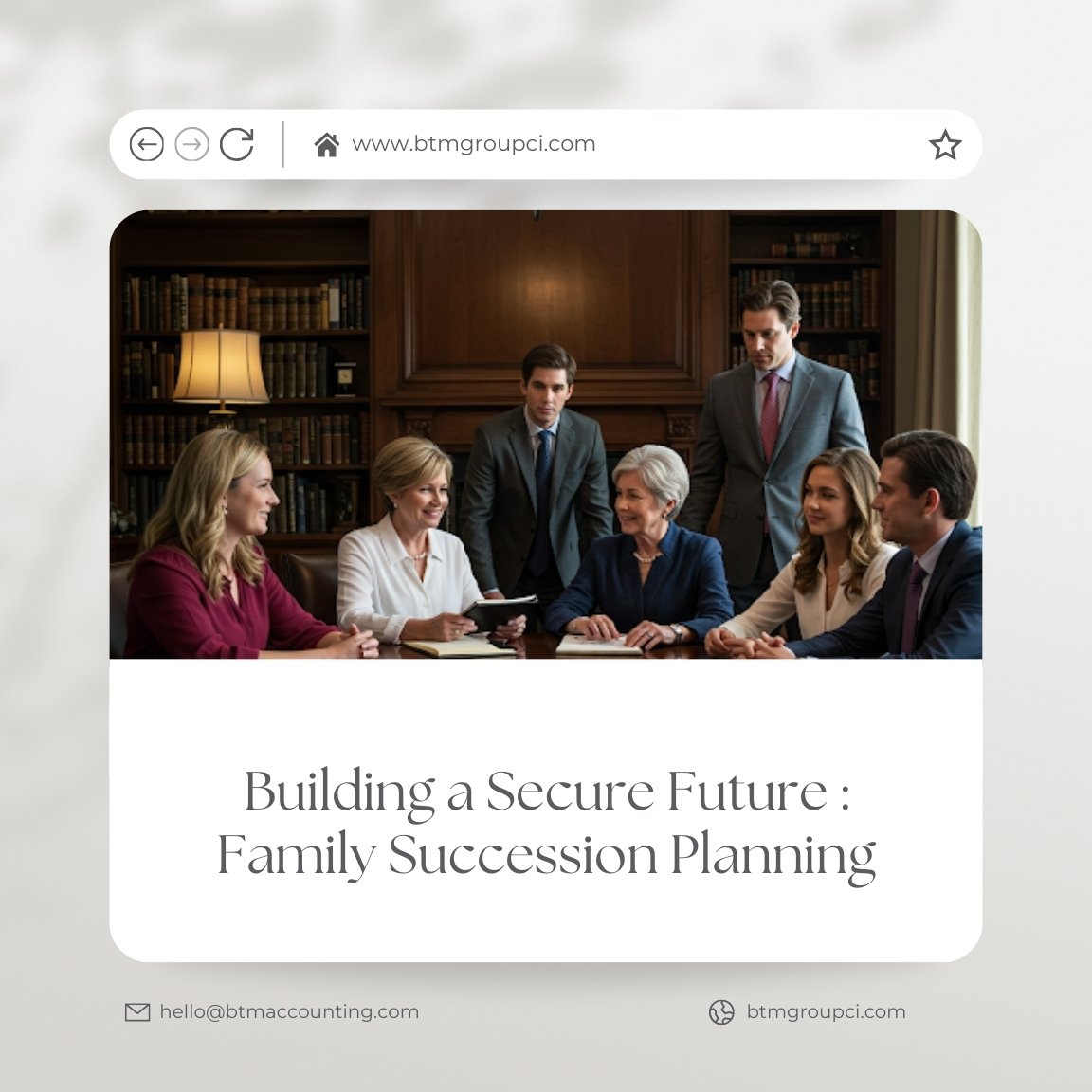Securing Your UK Family Business: Succession Planning
Family-owned businesses form the backbone of the UK economy, contributing significantly to employment and innovation. However, one of the most critical challenges they face is ensuring a smooth and successful transition of leadership and ownership to the next generation. This process, known as succession planning, is not merely about choosing a successor; it's a comprehensive strategy that safeguards the business's legacy, values, and long-term sustainability. Neglecting succession planning can lead to business disruption, family disputes, and ultimately, the potential demise of the enterprise.
This blog delves into the intricacies of succession planning for family-owned businesses in the UK, offering a detailed roadmap to navigate this crucial journey.
What is Succession Planning?
At its core, succession planning is the proactive and strategic process of identifying and developing individuals with the potential to fill key leadership and ownership roles within a business when the current incumbents retire, resign, or pass away. For family-owned businesses, this process has the added layer of considering family dynamics and the desire to keep the business within the family. It involves more than just naming a successor; it encompasses:
- Identifying future leadership needs: Understanding the skills and expertise required to lead the business in the years to come.
- Assessing potential successors: Evaluating the capabilities and potential of individuals, both within and outside the family.
- Developing future leaders: Providing training, mentorship, and opportunities for growth to prepare successors for their roles.
- Planning the transfer of ownership: Determining the legal and financial mechanisms for transferring shares and assets.
- Communicating the plan: Ensuring transparency and managing expectations among family members, employees, and other stakeholders.
Why is Succession Planning Absolutely Essential for UK Family Businesses?
Beyond the obvious need to replace retiring leaders, effective succession planning offers a multitude of benefits:
- Business Continuity: A well-defined plan ensures a seamless handover, minimizing operational disruptions and maintaining stability for employees, customers, and suppliers. Imagine a scenario where the founder suddenly retires without a clear successor – the resulting uncertainty could paralyze decision-making and erode stakeholder confidence.
- Preserving Family Harmony: Succession can be a sensitive issue, potentially leading to conflict among family members if not handled transparently and fairly. A proactive plan establishes clear roles, responsibilities, and expectations, mitigating the risk of disputes and preserving family relationships.
- Retaining Talent: Knowing there's a clear path for future leadership can motivate both family and non-family employees, fostering loyalty and reducing staff turnover. Talented individuals are more likely to stay with a company that demonstrates foresight and provides opportunities for growth.
- Maintaining Business Values and Culture: Family businesses often pride themselves on their unique values and culture. A carefully considered succession plan ensures that these core principles are passed down along with the ownership, preserving the company's identity.
- Facilitating Strategic Growth: Succession planning isn't just about replacement; it's an opportunity to strategically assess the future needs of the business and identify the skills and leadership qualities required to drive future growth and innovation.
- Ensuring Financial Security: A well-executed succession plan can optimize tax implications associated with the transfer of ownership and assets, safeguarding the financial well-being of both the family and the business.
- Attracting External Investment: A clear succession plan can increase the attractiveness of the business to potential investors or lenders, demonstrating a commitment to long-term stability and responsible management.
What Succession Challenges Might Family-Owned Businesses Face?
Family-owned businesses in the UK often encounter specific hurdles when it comes to succession planning:
- Blending Family Dynamics with Business Needs: Balancing familial relationships with the objective needs of the business can be challenging. Decisions about succession should prioritize the best interests of the company while being sensitive to family dynamics. This can manifest as pressure to appoint a less qualified family member over a more capable external candidate.
- Entitlement vs. Meritocracy: Ensuring that successors are chosen based on their skills and qualifications rather than solely on their family ties is crucial for maintaining business performance and morale. The perception of unfair advantage can demotivate non-family employees and even less capable family members who might be set up for failure.
- Emotional Attachment: Owners often have a deep emotional connection to their business, which can make it difficult to let go or to make objective decisions about its future leadership. This emotional attachment can lead to procrastination or a reluctance to relinquish control.
- Communication Barriers: Sensitive topics like succession can be difficult to discuss openly within a family. History, unspoken expectations, and fear of conflict can hinder honest and productive conversations.
- Lack of Formal Planning: Many family businesses operate informally, and succession planning might not be prioritized until a crisis arises. This reactive approach can lead to rushed decisions and limited options.
- Differing Visions for the Future: Family members might have conflicting ideas about the strategic direction of the business, making it challenging to agree on the qualities and vision needed in a successor.
- Tax Implications of Ownership Transfer: The transfer of business ownership can trigger significant tax liabilities, which need careful planning to mitigate and ensure the financial viability of the transition.
- Involving Non-Family Management: Deciding on the role and authority of non-family managers in a succession scenario can be complex and requires clear communication to avoid resentment or uncertainty.
How to Make a Good Family Succession Plan:
Creating an effective family succession plan requires a structured and thoughtful approach. Here are key steps to consider:
-
Start Early and Have Open Conversations: Don't wait until retirement is imminent. Begin discussing succession goals and potential timelines early. Facilitate open and honest conversations involving all relevant family members and key stakeholders. Consider using a neutral facilitator to manage potentially sensitive discussions.
-
Define Clear Roles and Responsibilities: Clearly outline the roles and responsibilities of both the outgoing and incoming leaders during the transition period. This helps avoid confusion and ensures a smooth handover of duties.
-
Assess Skills and Develop Potential Successors: Objectively evaluate the skills, experience, and aptitude of potential successors, both family and non-family. Identify any skill gaps and create tailored development plans that include training, mentorship, and diverse experiences within the business.
-
Establish Clear Criteria for Successors: Define the specific qualifications, experience, and leadership qualities required for future leaders. This provides a transparent framework for evaluating potential candidates and helps avoid decisions based solely on family ties.
-
Address Ownership Transfer Strategically: Work with legal and financial advisors to develop a tax-efficient and legally sound plan for transferring ownership. Consider various options like gifting, selling, or establishing trusts, and understand the implications of each.
-
Implement a Phased Transition: Avoid abrupt changes in leadership. Implement a gradual transition process that allows the successor to learn and grow into the role with the support of the outgoing leader. This could involve a period of co-leadership or mentorship.
-
Communicate Transparently with All Stakeholders: Keep family members, employees, customers, and suppliers informed about the succession plan and the progress of the transition. Clear and consistent communication builds trust and reduces anxiety.
-
Formalize the Plan in Writing: Document the succession plan clearly, outlining roles, responsibilities, timelines, and the process for ownership transfer. This provides a reference point and helps ensure accountability.
-
Seek External Advice: Engage experienced professionals such as succession planning consultants, legal advisors, and financial planners who specialize in family businesses. Their objective perspective and expertise can be invaluable in navigating the complexities of the process.
-
Review and Adapt Regularly: Succession plans are not static. Review and update the plan periodically to reflect changes in the business, the family, and the external environment. Be prepared to adapt the plan as needed.
Navigating the complexities of family business succession requires careful planning and expert guidance. At Breaking the Mould Accounting Limited, we understand the unique challenges you face.
Contact us today for a confidential consultation to discuss your succession planning needs and how we can help you secure your business's future.




%20(46).jpg)
